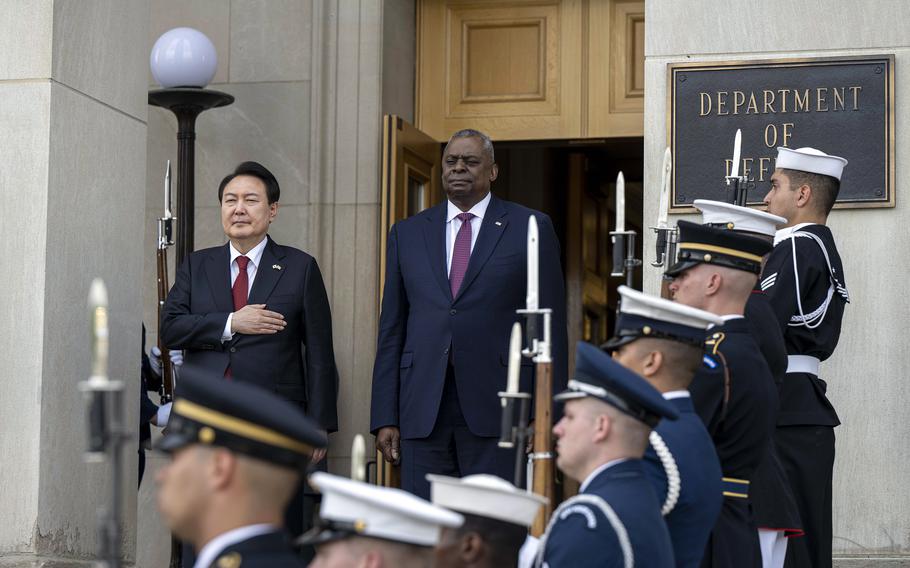
South Korean President Yoon Suk Yeol stands alongside Defense Secretary Lloyd Austin as the South's national anthem is played outside the Pentagon in Washington, D.C., April 27, 2023. (Alexander Kubitza/U.S. Navy)
The possible impeachment and forced ouster of South Korea’s president over his failed imposition of martial law this week could hamper the burgeoning trilateral security cooperation among the U.S., Japan and South Korea, a pair of East Asian experts say.
South Korean President Yoon Suk Yeol shocked the nation Tuesday evening by declaring martial law as a means of breaking political gridlock with opposition lawmakers.
Troops attempted to cordon off the National Assembly building, but a quorum of lawmakers overcame the blockade and voted to rescind the order for military control.
The opposition party on Wednesday moved to impeach Yoon, who is in the third year of a five-year term.
Impeachment would have a “negative impact” on trilateral cooperation that Yoon has helped usher in, according to Lami Kim, a professor at the Daniel K. Inouye Asia-Pacific Center for Security Studies in Honolulu.
“Because if he’s impeached, then the odds are that the opposition party will take the presidency next time,” she said by phone Wednesday. “The progressives — the opposition party — tend to be less interested in collaborating with Japan because they believe that Japan needs to do more. They believe that South Korea has made too many concessions without getting much in return from Japan.”
Still, the affair is not likely to greatly impact day-to-day military cooperation between South Korea and the U.S., Kim said.
“I mean, still, their mutual goal is to defend South Korea from North Korea’s threats, and that’s going to continue,” she said.
Yoon’s forced resignation could lead to a “rocky period” in the U.S.-South Korea alliance and the nascent trilateral partnership, according to Denny Roy, a senior fellow at the East-West Center in Honolulu who focuses on Pacific security and East Asia.
“We could soon simultaneously have a liberal president in South Korea, who is less pro-US and less [anti-North Korea], and a new US president who is an alliance skeptic and admirer of Kim Jong-un,” he said in an email Wednesday.
President-elect Donald Trump displayed little support for American alliances during his first term, and he has promised to resume transactional foreign policy when he takes office in January.
Kim sees a rough road ahead even if Yoon successfully fends off impeachment.
“I think that if Yoon Suk Yeol stays in power, then it’s going to weaken South Korea’s alliance with the United States,” she said. “One of the strengths of the Republic of Korea as the U.S.’s ally is that the two countries share values in democracy.
South Korea has been considered as a sort of a bulwark against autocracy in the region, but South Korea’s value as an ally would be diminished, Kim said.
“It will still be a strategically important relationship, but with Yoon in place, I think all the rhetoric that we have used and all the talking points would become useless,” she said.
“Already Western leaders are canceling events and meetings with him,” Kim said. “It is particularly shocking because Yoon Suk Yeol has portrayed himself as the supporter of democracy and liberalism around the world.
“I think that his diplomatic capital is pretty much gone,” she said.